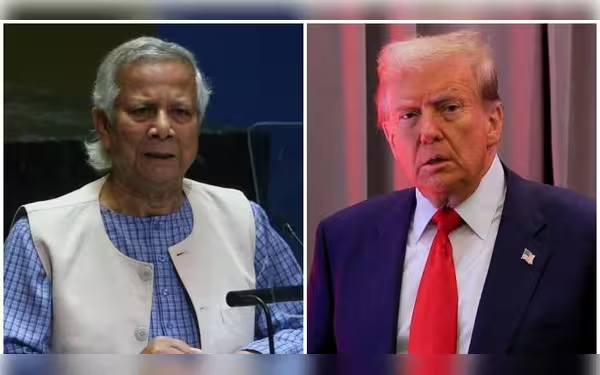Wednesday, January 15, 2025 11:05 AM
Yunus Advocates Stronger Bangladesh-US Relations Under Trump
- Yunus seeks enhanced Bangladesh-US economic ties.
- Garment industry crucial for Bangladesh's economy.
- Optimism despite Trump's past criticisms.
 Image Credits: thenews.com.pk
Image Credits: thenews.com.pkYunus expresses hope for stronger Bangladesh-US ties as Trump takes office, emphasizing economic cooperation and the importance of the garment industry.
In recent developments, Bangladesh's interim leader, Muhammad Yunus, has expressed his hopes for a stronger relationship with the United States as President-elect Donald Trump prepares to take office. This comes at a time when the U.S. remains the largest importer of Bangladeshi garments, a crucial sector for the country's economy. Yunus's optimism stands out, especially considering Trump's previous criticisms regarding the treatment of minorities in Bangladesh, a nation with a significant Muslim population.
Yunus, who is well-known for his work in social business and microfinance, believes that the new administration could pave the way for enhanced cooperation between the two nations. He emphasizes the importance of trade and economic ties, which are vital for Bangladesh's growth and development. The garment industry, which employs millions of workers, particularly women, is a cornerstone of the Bangladeshi economy. Therefore, maintaining a positive relationship with the U.S. is essential for sustaining this industry.
Despite the challenges posed by Trump's past remarks, Yunus remains hopeful. He suggests that the new administration might focus on economic partnerships rather than political disagreements. This perspective is crucial, as it highlights the potential for dialogue and collaboration, even in the face of differing views on human rights and governance.
As the world watches the unfolding dynamics between Bangladesh and the United States, it is clear that both nations have much to gain from a strengthened partnership. For Bangladesh, the U.S. market is not just a source of income; it represents opportunities for growth, innovation, and improved living standards for its citizens. On the other hand, the U.S. can benefit from a stable and prosperous Bangladesh, which can contribute to regional stability and economic development.
While challenges remain, Yunus's optimism serves as a reminder that diplomacy and trade can often bridge divides. As the Trump presidency begins, it will be interesting to see how these two nations navigate their relationship and whether they can find common ground that benefits both sides. The future of Bangladesh's economy and its people may very well depend on the strength of this partnership.













